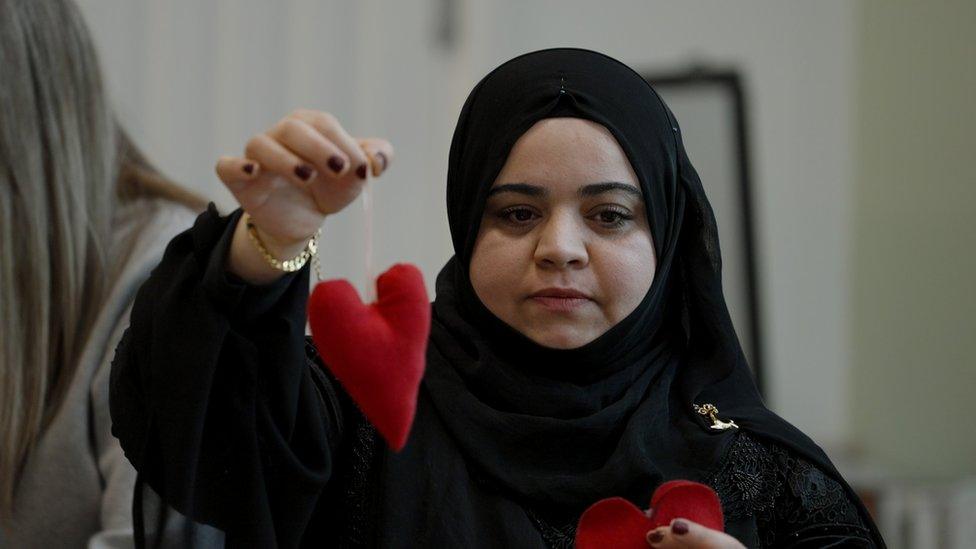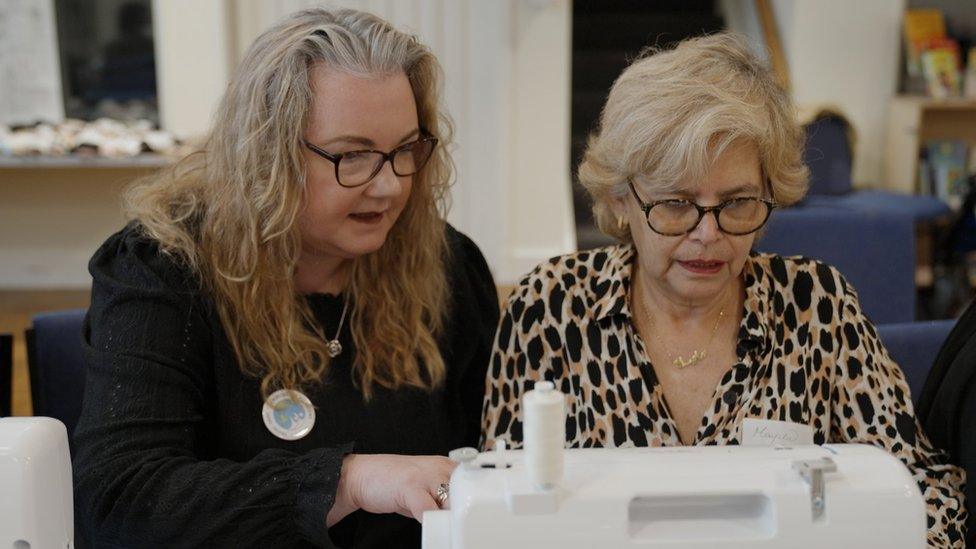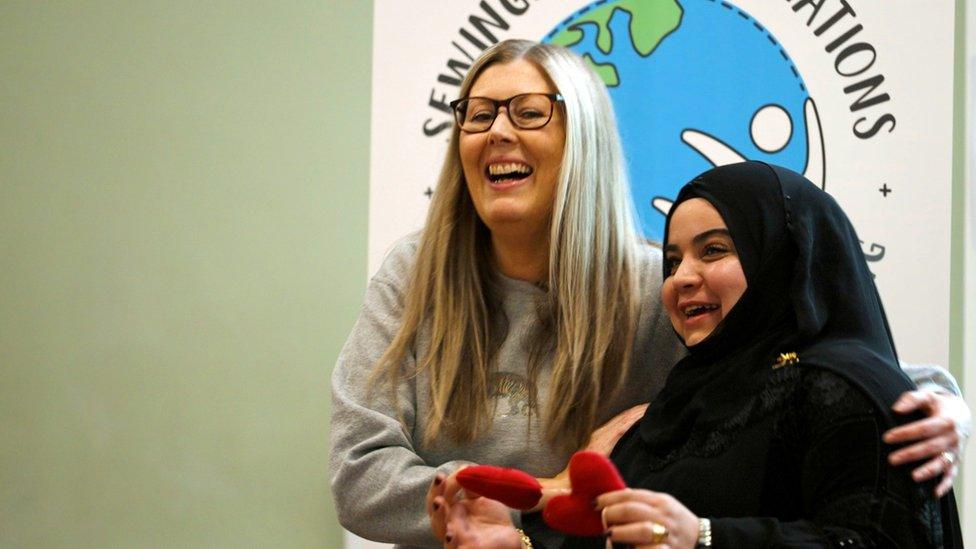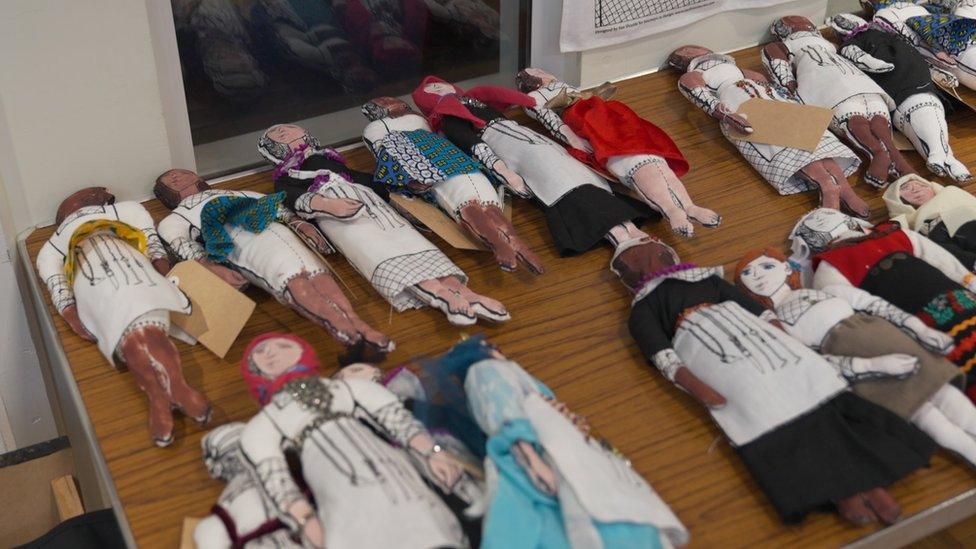Sewing group gave refugee a voice after 10 years in the UK
- Published
Aysha Aljaf learned English at a sewing group in Paisley
For the first 10 years of her life in the UK, Aysha Aljaf relied on an interpreter.
She arrived in England in 2008 on a spouse's visa, having fled her home in Kurdistan, in northern Iraq - her husband had already gone through the UK's asylum process.
The mother of two went on to learn some English through college, but did not have the confidence to tackle conversations on her own.
That was until she moved to Scotland and discovered a group of refugee women, who met in a small church in Renfrewshire to share their sewing skills and talk amongst friends.
"When I came here, for more than nine years I was living in the UK - I can't speak," Aysha told the BBC. "Everywhere I went I took an interpreter with me.
"I came to see [the sewing group], it was really fabulous. I'm so happy I found it. I came for a few days and they asked me to start teaching. I've been coming now for three and a half years. I've learned more English than in college.
"I speak because face-to-face you can talk about everything, there's more learning. My [vocabulary] is much better than before because I meet with a lot of ladies and very nice families."

Aysha went on to volunteer with the group, demonstrating how to sew toys and decorations
Sewing2Gether was founded in 2018 by freelance sewing tutor Gabi Cullen, who runs workshops from the Mossvale Community Church in Paisley.
Funded by Renfrewshire Council, the group teaches participants about textile upcycling, helping them turn unwanted or discarded fabric into clothes, toys and gifts.
It began with just one attendee for the first few months - but now more than 40 refugee women come along to sew, make friends and develop their conversational English.
Aysha said the network of women has not only improved her language skills but has been willing to help her fill in forms.
Now a British citizen, she has volunteered as a sewing tutor with the group and went on to secure work as a self employed seamstress.

Co-founder of Sewing2Gether Corinne Watt (left) and volunteer (right)
Sewing2Gether, she said, is one of the most important things in her life.
"It's more important than my house," she said. "Because here… I see family, friends and everyone.
"Everyone has an open heart for you each in a different way, which is why I think it's more important than everything for me - not just for me, for every refugee lady."
The group has so far worked with women from 25 countries, speaking 17 different languages.
Flash cards with common phrases in English are incorporated into workshops, and people can chat over a hot drink and are given a lunch.

Gabi Cullen founded Sewing2Gether in 2018
Speaking to the BBC, founder Gabi Cullen said: "One of our members said with this group, we can talk and laugh together and forget about our past. She said, just sharing the moment with good people, that's what makes it special.
"We have a library and we do travel empowerment. So if we have a member who is a bit afraid to access public transport - maybe not being able to speak English or read it or just the confidence to travel alone. We help with that, we also do a bit of advocacy work as well."
This year, refugee women in the group are producing an exhibition of hand-sewn "Millie dolls" as part of the Refugee Festival Scotland programme, external, from 22-25 June.
The fabric dolls represent the textile heritage of Paisley, and the tens of thousands of linen mill workers - known as 'Millies' - who worked in the industry at the peak of trading in the 20th century.
The dolls are also intended to reflect the legacy of women who pass sewing skills through generations.

Millie dolls made by women at the Sewing2Gether group
"We liked what Millie represented," said Gabi. "She represents a mill worker - a strong, resilient women, and we just thought that was a good connection for us.
"It's great to be able to take part in the exhibition at the Refugee Festival.
"Many of our ladies, for various reasons, cannot be photographed or filmed, so it's great to have a doll that they've made that represents them."
Aysha added: "The festival is important because it opens our voice - you say 'we are here, not just sitting in our homes, we have a voice,' the same as each other."
Refugee Festival Scotland runs from 17-26 June.